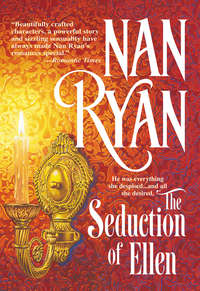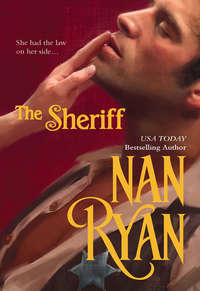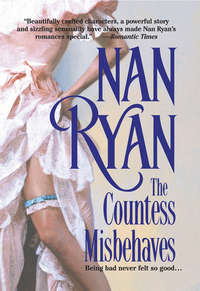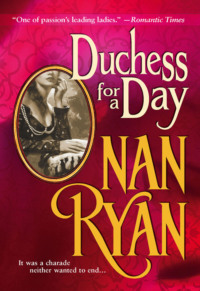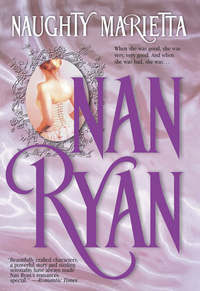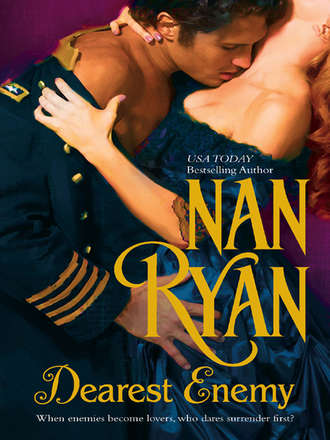
Полная версия
Dearest Enemy
Then he stepped back from her and was gone.
Suzanna stayed on the veranda long after Ty and Matthew had disappeared. Chilly despite the warmth of the sunny spring day, she fought one of those “disturbing feelings” that sometimes came over her, a strong premonition of danger.
She had never discussed those inexplicable sensations with anyone other than the understanding Cynthia Ann. Sharing such unexplainable anguish with her levelheaded brother would have brought only mild scorn and a swift reassurance that such feelings meant nothing. Had she confided in her mother, it would have further upset the older woman. And Suzanna tried never to needlessly worry the fragile Emile.
Lost in troubled thought, Suzanna blinked and came back to the present when she heard Cynthia Ann calling her name. The Grayson brougham had rolled to a stop in the driveway and Cynthia Ann was rushing up the walk. Heartened, Suzanna hurried to meet her.
As the two young women embraced, Suzanna said, “Oh, Cyn, I'm so glad you came because—”
“I know,” Cynthia Ann interrupted. “We passed Ty and Matthew riding away at a gallop. I knew you'd be upset, but they'll soon be back and…”
“It's more than their leaving, Cyn. It's…I'm experiencing one of those eerie, awful feelings. Like something really terrible is going to happen.”
Cynthia Ann squeezed Suzanna's narrow waist. “Suz, I'm so sorry. Let me stay here with you until it passes.”
“Would you? I'm frightened and I can't worry Mother.” She pulled back, looked at the shorter girl, and was startled to see bright tears shining in Cynthia Ann's eyes. “What is it? Has something dreadful already happened? Is that what I sense?”
“We're going away, Suz.”
“Going away? But…why? Where?”
“Boston. Father is sending Mother and me to stay with my maiden aunt in Boston until this is over.”
“Oh, Cyn, must you?”
“Father says there's sure to be bloody battles right here in and around Washington.” She swallowed hard and added, “Dearest friend, you and I are to be on opposite sides in this war. Father's pledged allegiance to the Union Army and so has my darling Davy.”
“Dear Lord, I hadn't thought of that,” Suzanna said, realizing with horror that scenes such as this were taking place all over the city. The war was tearing apart lifelong friends, even families.
“It isn't my fault, Suz,” said the now weeping Cynthia Ann. “Please don't hold it against me.”
Tears spilling down her own cheeks, Suzanna said, “Darling Cyn, nothing could ever change the way I feel about you. You're the sister I never had, and I shall love you always. None of this is your fault, nor mine. It changes nothing between us.”
“I knew you'd understand.”
“When are you leaving?”
“Mother and the servants are busy packing now and…Tomorrow. Early tomorrow morning.”
“So soon? It's like a knife through my breast,” Suzanna said honestly. “This—your leaving me—must be responsible for the terrible feeling I have.” She looked hopefully at Cynthia Ann. “That's it, isn't it, Cyn? That's the bad thing I perceived was going to happen.”
“I'm sure it is, dear. And I'm so sorry to be deserting you when you need me most.”
“I'll be all right, truly I will. And you will write me often and I will answer. And when this conflict ends, you will come home and we will be just as we always were.”
“Yes. Yes, we will. Nothing can ever damage our friendship.”
“Absolutely not. Now come on inside and let's enjoy our last afternoon together.”
Six
July 1861
Creamy white flowers covered the rosebushes that grew just outside the open floor-to-ceiling windows. The fragile blossoms undulated in a gentle breeze blowing out of the south. The rhythmic shimmering stirred the flowers' seductive fragrance, sending the subtle scent wafting through the windows and into the spacious ground floor bedchamber.
“Umm, smell that,” purred a voluptuous naked woman lying stretched out on the silk-sheeted bed, arms flung above her head, midnight hair spilling across the lace-trimmed pillows. “Like the sweetest of honey.”
“I smell you,” said the man who, shedding the last of his clothes, came down onto the bed beside the woman.
“And how do I smell?” she asked, turning on her side and raking long fingernails through the coal-black hair covering his broad, muscled chest.
“Hot. Pungent. Like a highly aroused female in need of immediate sex,” he said, unworried that she might take offense.
No chance of that. Mitch Longley knew her too well. Mrs. Dawn Bell Thompson Bond Merriweather, a wealthy and beautiful twice-widowed, once-divorced brunette who was accepted in Washington society mainly because she was extremely wealthy, had let him know the night they met exactly what she wanted from him.
As they had danced in the ballroom of this very mansion—one of three grand residences she owned—she'd wasted no time in explaining why Mitch had been invited to the evening's glittering soiree.
“Admiral Longley,” she had said, “since the afternoon when I was walking past the War Department with a good friend and you and I very nearly collided, I have thought of little else but you.”
“Madam,” Mitch had reminded her, “the incident happened only yesterday afternoon.”
She'd laughed gaily and said, “Well, you can't very well expect a lady to live in torture forever, now can you, Admiral?”
“I'm afraid I don't quite follow.”
“Don't you?” she said, and none-too-subtly insinuated her chiffon-gowned knee between his. Her gloved hand firmly urging his head down, she'd put her lips against his ear and whispered, “I want you to make love to me. Tonight. Here in my home. In my bed. After my guests leave. Or before. It's up to you. We can go to my suite right now if you like. It's just down the hall.” She pulled back to judge his reaction.
Mitch Longley was unfazed. Hers was not the first, nor would it be the last, decidedly unladylike proposition he had received from a spoiled, desirable woman. He made no misstep. His handsome face did not change. She might have been commenting on the weather for all that registered in his continuing calm demeanor.
Taken aback, Dawn said, “Perhaps you still don't fully understand me, Admiral. I am suggesting that—”
“I'm not titillated by the prospect of making love to a woman while she's entertaining a houseful of people.” He smoothly danced his brash hostess to the edge of the floor and deposited her there. Speaking loudly enough for others to hear, he thanked her for the dance and for the evening. Dawn Merriweather's face fell with disappointment.
Then Mitch leaned close and whispered in her ear, “Get rid of them. I'll be back at midnight. If you're not alone, don't expect me to stay.”
Without another word, Mitchell B. Longley, wealthy Maryland native, Union naval officer, graduate of the Naval Academy at Annapolis, class of '48, turned and left, with Dawn Merriweather staring after him.
When Mitch returned to the mansion at the stroke of midnight, a uniformed butler admitted him into the silent house and directed him to a set of closed double doors at the end of the wide downstairs corridor.
Pausing before those doors, Mitch raised his hand, then lowered it without knocking. He walked into the white-and-blue-decorated suite and closed the door behind him. She was not in the spacious sitting room, where huge white sofas and overstuffed blue easy chairs rested before a white marble fireplace. Mitch crossed the room. He went directly to the open connecting doors, stepped inside the candlelit bedroom and saw her.
The beautiful Dawn Merriweather, in a virginal white dressing gown, with her lustrous black hair falling loose around her shoulders, stood beside the big feather bed.
“I thought perhaps you weren't coming,” she said, seductively running a thumb and forefinger down the lapel of her shimmering robe to call his attention to the rigid nipples pressing proudly against the shiny fabric.
“You knew very well I would come,” he said. “Take that thing off.” He gestured to her garment.
“No,” she said, letting her arms fall to her sides. “You take it off, Admiral.”
Mitch shook his head and turned to leave.
“Wait! Come back. It's off! The robe's off!” she said, frantically yanking at the sash and sending the slippery covering to the carpeted floor.
Mitch stopped, turned and smiled. She was naked, her voluptuous body as beautiful as her face. She was Venus di Milo in the flesh, yet this goddess of love and beauty had arms with which to hold him.
In seconds Mitch was as naked as she. In minutes they were atop her feather bed going at each other in a no-holds-barred frenzy of raw sexual hunger. Mitch learned on that very first night that Mrs. Merriweather was insatiable. And that, not surprisingly, she was a highly experienced lover who was able to teach him a trick or two.
Now on this hot July afternoon a month after they'd met, the delectable Dawn sat astride the prostrate Mitch and aggressively rode him, determined to keep him hard and hot and here inside her. Her heavy breasts swaying with her slow undulating movements, midnight hair whipping around her face, she gazed steadily into his hooded green eyes and praised his prowess as a lover.
Mitch knew all her games. He knew exactly what she was up to on this particular afternoon. He had informed her the minute he arrived that he could stay for only an hour. He'd gotten his orders. He was to report to the Washington navy yard to board the USS Pawnee at 4:00 p.m. By dusk the Union warship would sail with the tide to Alexandria, Virginia.
Prolonged lovemaking was enjoyable. Still, Mitch had no choice but to take matters into his own hands and bring them both to a hasty release. He rolled up into a sitting position, slipped his hands beneath Dawn's bent knees, pressed them to his sides and firmly clasped the twin cheeks of her buttocks. While she anxiously hugged his head to her breasts, Mitch pumped into her with a fury.
“Nooo!” she protested when her climax began. “Not yet, Mitch, I…I…ooh, yes, yes!”
Seven
Despite the war, Suzanna had lost none of her youthful optimism. She constantly reminded her worried mother that the conflict would soon be over and the South would be victorious. Then Matthew and Ty would come riding home, heroes on horseback.
Suzanna looked eagerly forward to the few short letters she received from Ty. She read them over and over again. Then she carefully placed those precious missives in an empty, ruffle-trimmed bonbon box to keep forever. Her last letter from Ty had come from Manassas, reaching her on July 19.
Dearest Suzanna,
I miss you so much it is a physical pain. But I do have something of you—the rose you placed in my lapel on the morning we parted. I keep it with me at all times, inside my tunic, next to my heart.
Matthew and I have not suffered so much as a scratch. We're fortunate to be together and even more fortunate to serve in the Confederate Army of the Potomac under the flamboyant Brigadier General Pierre G. T. Beauregard.
Dearest, we are bivouacked outside Manassas, near the railroad junction where the massing of Confederate troops continues. We are hoping to engage and vanquish the enemy very soon. Ours is a mighty force, sweetheart. Do not worry.
All my love,
Ty
Even prior to receiving Ty's letter, Suzanna had heard that a buildup of both Union and Confederate troops was taking place in Manassas. She realized a battle was inevitable.
She did not allow herself to worry. She continued to plan for the lavish wedding and for the romantic honeymoon in Paris that Ty had promised her. She happily envisioned the day when she would walk down the aisle on Matthew's arm to become Mrs. Ty Bellinggrath.
Until that much-anticipated hour, she would keep busy and quietly do whatever she could to aid the Confederacy.
Suzanna tirelessly rolled bandages and collected spare medications for the troops from those families she knew to be sympathetic to the Cause.
Since her Virginia home was just across the river from the bustling Union capital and its hordes of uniformed Yankee soldiers, she had to be extremely cautious about declaring her loyalty to the South. Hardly anyone supportive of the Confederacy had remained in the Washington, D.C. area. Most had fled shortly after war broke out.
Suzanna missed her friends, especially Cynthia Ann Grayson, with whom she had always shared her secrets. Now she had no one to confide in. She was lonely for those absent companions, but didn't allow herself a great deal of time to dwell on her isolation.
Since Matthew was away, the responsibility for looking after their mother and overseeing the family businesses had fallen on Suzanna's shoulders. She never bothered her mother with complicated affairs of enterprise. Emile LeGrande, married as a young girl, pampered by her husband and then her son, had never paid any attention to complicated concerns of commerce.
Emile had always taken their wealth for granted and had never been curious about any of her husband's business ventures. Indeed, she had no idea what they owned or how much they were worth. After Lawrence LeGrande's passing, Matthew had rightfully stepped into the role of manager of the estate.
Suzanna was acutely aware that she could not enjoy the luxury of disinterest where their holdings were concerned. In the days prior to his leaving, Matthew had patiently schooled his sister on the diverse LeGrande interests.
Now, in his absence, Suzanna spent a great deal of time poring over various ledgers, attempting to make sense of the neat columns of numbers. Deposits from profits, deductions of payouts for labor rendered. She made every attempt to keep informed on where they stood financially.
Suzanna didn't mind the responsibility. She prided herself on being as intelligent as any man, and assumed that she could easily shoulder the task until Matthew's return. She loved her mother dearly and was resolved never to burden her with worries regarding their livelihood.
Keeping the family ledgers balanced was not Suzanna's only duty. When the war began, a number of the servants had deserted Whitehall. Of the few who remained, none wanted to journey too far from home. Understanding their confusion and fear, Suzanna assured them that they need not leave the safety of the mansion. If they would see to the household chores, she would do the necessary marketing.
In truth, she rather enjoyed venturing forth to choose fresh fruits and vegetables from the sidewalk stalls just across the river. And it afforded the opportunity to eavesdrop and learn about the war's progress, to hear news of troop movements. Her mere presence in the staunchly Union city was an unspoken assurance that her alliance lay with the North. In the interest of self-preservation, she allowed that assumption to go unchallenged. Indeed, she enhanced it by pretending delight on hearing people proclaim that the mighty Union would make short work of putting down the rebellion.
At market on the blistering hot afternoon of July 22, 1861, Suzanna observed great numbers of the shattered Union Army marching wearily into Washington. When she inquired about the meaning, an old gentleman who was clearly disappointed informed her that “the upstart Confederates have been victorious at Manassas.”
“Ah, that's too bad,” Suzanna commented, hoping her face did not betray her true feelings.
She went on carefully choosing ripened peaches and placing them in the basket over her arm, suppressing the smile that was playing at her lips.
Then, all at once, from out of the blue, one of those dreaded “feelings” came over her. The blood drained from her face. Her basket of fruit fell to the ground. She didn't bend and pick it up. She immediately left the outdoor market. She hurried back across the bridge, anxious to get home, plagued with an icy fear that something had happened to Ty or to Matthew.
Her heart drumming in her ears, she fought the panic that was threatening to choke her. By the time she reached the circular drive of Whitehall, she was out of breath and had a painful stitch in her side.
She stopped at the front gate, pressed a hand to her aching side and blinked away the sunspots dancing before her eyes. Her anxiety escalated when she looked up and saw her frail mother standing on the veranda. Old Durwood, the only male servant still at Whitehall, was at her side, supporting her.
“No,” Suzanna murmured soundlessly, “please, God, no. No, no, no.” She lifted her skirts and raced up the front walk.
She reached her mother, looked at Emile with questioning eyes. The older woman said nothing, but her wet cheeks and ashen face spoke volumes. Suzanna looked from her mother to Durwood and back again.
“Matthew? Is it Matthew?” Suzanna asked, studying her mother's face. No reply. “Ty?” Suzanna could hardly get his name out. “Dear Lord, it's Ty, isn't it? Ty has been…”
“B…both,” Emile LeGrande barely managed to whisper. “Both of them,” she murmured, and then began to sob so violently she could say no more.
“Both? No! No, that's impossible. It can't be, it cannot be true.” Suzanna, refusing to believe, looked at the stooped servant. “Durwood, tell me this is all a terrible misunderstanding! It has to be a mistake. Why, I just heard at the Blakely Street market that the Rebs have had a stunning victory at Manassas, so you see…it…they…Matt and Ty…”
“Miz Suzanna,” said the kindly Durwood. “Miz Emile was not feeling well, so she send me round to Doc Ledet's for some—”
“Ah, there, that's it!” Suzanna seized on the possible misunderstanding. “Mother's feeling ill and she had a bad dream while napping. The same thing has happened to me many times.” Nervously, she smiled and stated, “Mother hasn't been out of the house, so she couldn't possibly have heard that…”
“Miz Suzanna, I tol' you I was at Doc Ledet's. The doctor, he had been out and he checked the weekly casualty list.” Durwood swallowed hard. “He assumed we knew. He thought that's why I come for him, 'cause Miz Emile she be so distraught over…” His words trailed away.
Suzanna was shaking her head, refusing to accept it. “If it were true, Dr. Ledet would have come right over….”
“He did, Miz Suzanna. The doctor come home with me to be with Miz Emile.”
Suzanna felt her world swiftly spinning out of control. “He came? Then where is he? Surely he wouldn't be so callous as to leave Mother alone when…when…”
“He had to go, Miz Suzanna. He's needed at the hospital to tend Union wounded coming in from Manassas.”
For a long moment, Suzanna said nothing more. She just stood there staring at her grieving mother and the teary-eyed servant. When she did speak, it was in level, well-modulated tones. “Durwood, are you absolutely certain that Dr. Ledet said…” She drew a shallow breath. “Both of them? Matt and Ty both…killed in battle? They're gone? They are never coming home?”
“Yes'em, he was sure,” the old man said. “If it be any help, the doctor said this first land battle of the war was a clear victory for the Confederacy.”
Suzanna nodded feebly. She closed her eyes, opened them. She dutifully stepped forward and put an arm around her mother's trembling shoulders.
Suzanna drew a spine-stiffening breath and said softly, “Yes, Durwood, it does help. It helps a great deal. I am certain that Ty and Matt were heroic and that we can all be very proud of them both. Thank you so much. You may go.”
“Anything I can do, I will, Miz Suzanna.”
“I'll call if we need you.”
The old man nodded and, blinking back tears, crossed the veranda and moved gingerly down the steps. He slowly circled the mansion and went to his quarters in the carriage house.
Suzanna heard a roaring in her ears. She felt faint and sick. She longed to scream in pain, but she didn't. She had to be strong for her helpless mother. She held the weeping Emile in her arms and comforted her, soothing her as if she were a fretful child.
When, finally, Emile was so exhausted she stopped sobbing and had calmed a little, Suzanna took her inside. She put her mother to bed and gave her a small amount of the laudanum that Dr. Ledet had supplied. She sat with her mother until Emile fell into a welcome slumber.
It was nearing sunset when Suzanna tiptoed out of the room and quietly closed the door. She walked down the grand staircase as if in a trance. In the foyer she paused and wondered, Should I turn and go into the library? Or should I make my way to the kitchen and see about the evening meal? Or perhaps go up to my room and write a note of sympathy to Ty's parents?
What exactly did a person do when she'd just received word that the two men she loved most in all the world were dead? When she'd been told that she no longer has the protective big brother who had been with her all of her life. That she would never be the bride of the handsome young man who'd promised to take her to Paris and to cherish her forever?
For a long, tortured moment, Suzanna stood there unmoving in the silent foyer, wondering how she could possibly endure this double tragedy. How she could go on when all was forever lost.
She couldn't.
It was too much.
She couldn't stand it.
At last, that much-needed release swamped her.
Suzanna put her hand over her mouth to stifle the wrenching sobs that were tearing at her tight throat. She flew out of the house, across the veranda and down the front steps. She raced around the mansion and out into the back gardens. She ran until her legs finally grew too weak to carry her, and her heart was burning in her chest, her hot face wet with rapidly flowing tears.
She had reached the riverbank when her knees buckled. She fell forward, sprawling on her belly, her hooped skirts belling up behind her. She didn't rise. She screamed and cried and beat on the ground with her fists, overcome with grief and pain. She cried until there were no tears left and her eyes were swollen half-shut. Until her head throbbed painfully and her fists were bloody from striking the ground.
Then she fell silent.
And still.
Completely still.
She stayed there until the summer sun had completely gone down and a pale silver moon had lifted above the treetops and was inching up into the night sky.
With great effort, Suzanna turned over onto her back. She lay there for some time, then finally sat up. She wearily rose to her feet and walked toward the house.
And as she climbed the back steps, she squared her tired shoulders, lifted her chin and silently promised her sweetheart and her brother that she would avenge their deaths.
She would not rest until she had caused Yankee blood to spill. Somehow, some way, she would make the hated Union pay for what they had done. She didn't care who she had to hurt. She didn't care what she would be required to do to exact reprisal. Nothing could be too dishonorable or too distasteful if it meant the certain defeat and death of at least one hated Yankee bastard!
Eight
Suzanna understood her mother's suffering. She shared that pain, but dealt with her own loss in a very different way. While Emile languished in her room, often too distraught to even come downstairs, Suzanna paced the drawing room restlessly, scheming, plotting, considering how she could best help the Confederacy.
Impatient to begin an endeavor wherein she could be of genuine value to the Cause, Suzanna realized she had to bide her time until her mother grew a bit stronger. But she despaired of her mother ever growing stronger.
Suzanna was determined to help the war effort and, more importantly, to avenge the deaths of her beau and her brother. While she waited for her mother's health to improve, she considered and discarded idea after idea.
Then, one cold February morning in 1862, Dr. Milton Ledet, the family physician who had delivered both Matthew and her, unwittingly came up with the perfect strategy for Suzanna. One she hadn't seriously considered, but which was ingenious.


